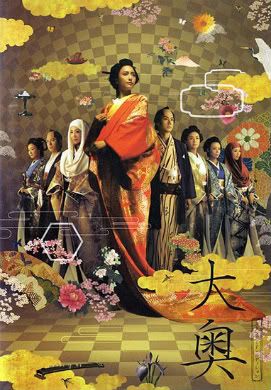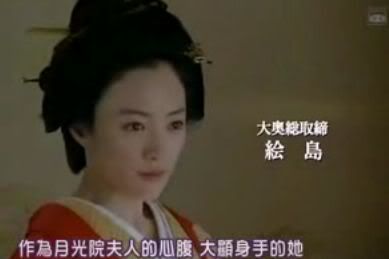大奥 劇場版 2006
Spoilers ahead
I got desperate.
Yes. After finishing Nobuta wo Produce and left with half a Sunday yet not being able to find good links for Mei-chan, Maid Deka & Erai..
I got desperate with withdrawal symptoms.
So much so that I scrolled through Yukie's featured films and came upon this which had a working link that was easy enough to find.
大奥 is a historical dorama spanning 5 seasons that made its debut in 1968, with a total of 103 full episodes for the 1st 2 seasons. The series was picked up again in 2003 and ran for another 3 seasons. The focus is set on the women in the courts, from the wives to the concubines to the maids, their struggle for power, love & hatred, and the internal clashes among the houses.
大奥 劇場版 was released in 2006, depicting only the Ejima-Ikushima affair.
In the movie, Ejima is the intelligent and talented head matron of the Inner Palace, while Gekko-in, is the paternal mum of the ruling Shogun, a young 5 year old kid, who is placed in power with the death of his dad.
Ten'ei-in, the first wife of the late shogun who was unable to carry on his lineage, was extremely infuriated by the fact that the shogun title and power had been passed to the Gekko-in courts, and is always making trouble for Gekko-in and Ejima. Ejima, being fiercely protective of Gekko-in, who took her in when she was young, stepped on many of the others tails, Ten'ei-in inclusive, with her guts and wits.
There was rumours that Gekko-in had an affair with Akifusa Manabe, the advisor to the kid Shogun, which leads to Ten'ei-in plotting a conspiracy together with the anti-Gekko-in group, i.e. disgruntled councilors jealous of Akifusa's position and the other wives, recruiting the charasmatic Kabuki actor Ikushima Shingoro to seduce the headstrong Ejima so as to force her to betray Gekko-in.
Ejima was aware of Ikushima's initial intentions and was rather wary of him, but her defence crumbled when he saved her from the burning Kabuki theater which Ten'ei-in set fire on and separated her from the rest of the courtesans amidst the chaos. He brought Ejima through the party of people celebrating Harvest Festival, where she had a fun experience and boarded a boat house at the river, admiring the fireworks and making love.
Back at the Palace, both Ikushima and Ejima were summoned and accused of having an illicit relationship that night. Most of the courtesans that was present at the Kabuki theater were named and punished, which were mainly from the Gekko-in courts.
However, contrary to Ten'ei-in's plans, Ikushima denied their relationship and was tortured and eventually placed on death row with his minder. Ejima on the other hand, was coerced by Ten'ei-in & gang to betray Gekko-in and admit the relationship between Gekko-in & Akifusa or have punishment served to both her and Ikushima. She refused to betray Gekko-in but was pardoned of the death sentence by the young shogun and instead banished to Miyakejima.
Oh man! Yukie looks absolutely beautiful decked in full traditional costume. She is like, so versatile, able to do both modern and yet look good in period shows! But then, her characteristic heave-shoulders-seething-breath is still visible, which I notice in almost every show, and at some points, she actually look more modern than the rest of the people.
The kimonos were extraordinary, the sets were scenic, esp the riverbank, but, the budget was big as well.
The show was terribly boring in the first half, very slow plot progress and I would have wanted to turn it off 20 min into the show with all the court jealousy and fights. The story improved slightly when Ejima met Ikushima at the shrine where she was praying for Gekko-in and Akifusa under the instructions of Gekko-in and later on climaxed at the fire of the theater.
Errmm.. I shall try not to watch any more period dramas to avoid falling asleep at the slow plot or laffing at the cheesy hairstyles, although the next 大奥 movie to be screened in Oct 2010 will feature Maki-chan..


No comments:
Post a Comment